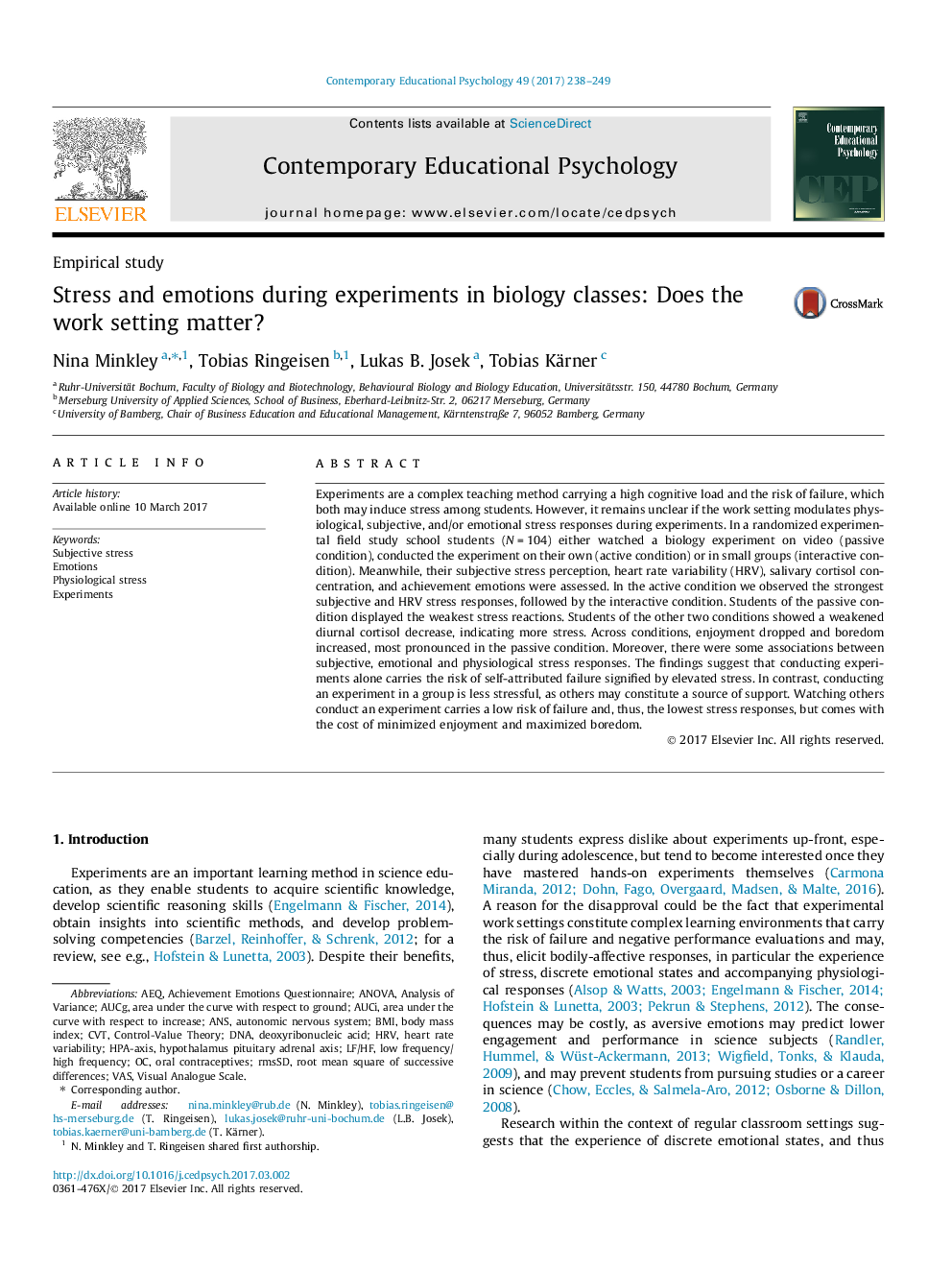| کد مقاله | کد نشریه | سال انتشار | مقاله انگلیسی | نسخه تمام متن |
|---|---|---|---|---|
| 4937906 | 1434670 | 2017 | 12 صفحه PDF | دانلود رایگان |
عنوان انگلیسی مقاله ISI
Stress and emotions during experiments in biology classes: Does the work setting matter?
ترجمه فارسی عنوان
استرس و احساسات در طول آزمایشات در کلاس های زیست شناسی: آیا تنظیم کار مهم است؟
دانلود مقاله + سفارش ترجمه
دانلود مقاله ISI انگلیسی
رایگان برای ایرانیان
کلمات کلیدی
root mean square of successive differencesAUCGHypothalamus pituitary adrenal axisVASLF/HFAUCiAEqRMSSDCVTDNA - DNA یا اسید دزوکسی ریبونوکلئیکHRV - ENGExperiments - آزمایشSubjective stress - استرس ذهنیPhysiological stress - استرس فیزیولوژیکdeoxyribonucleic acid - اسید deoxyribonucleicanalysis of variance - تحلیل واریانسANOVA - تحلیل واریانس Analysis of varianceAutonomic nervous system - دستگاه عصبی خودمختار یا خودگردان یا اتونومANS - سالbody mass index - شاخص توده بدنBMI - شاخص توده بدنیHPA-axis - محور HPAvisual analogue scale - مقیاس آنالوگ بصریControl-value theory - نظریه ارزش کنترلheart rate variability - نوسان ضربان قلبEmotions - هیجاناتoral contraceptives - پیشگیری از بارداری خوراکی
موضوعات مرتبط
علوم انسانی و اجتماعی
روانشناسی
روان شناسی کاربردی
چکیده انگلیسی
Experiments are a complex teaching method carrying a high cognitive load and the risk of failure, which both may induce stress among students. However, it remains unclear if the work setting modulates physiological, subjective, and/or emotional stress responses during experiments. In a randomized experimental field study school students (NÂ =Â 104) either watched a biology experiment on video (passive condition), conducted the experiment on their own (active condition) or in small groups (interactive condition). Meanwhile, their subjective stress perception, heart rate variability (HRV), salivary cortisol concentration, and achievement emotions were assessed. In the active condition we observed the strongest subjective and HRV stress responses, followed by the interactive condition. Students of the passive condition displayed the weakest stress reactions. Students of the other two conditions showed a weakened diurnal cortisol decrease, indicating more stress. Across conditions, enjoyment dropped and boredom increased, most pronounced in the passive condition. Moreover, there were some associations between subjective, emotional and physiological stress responses. The findings suggest that conducting experiments alone carries the risk of self-attributed failure signified by elevated stress. In contrast, conducting an experiment in a group is less stressful, as others may constitute a source of support. Watching others conduct an experiment carries a low risk of failure and, thus, the lowest stress responses, but comes with the cost of minimized enjoyment and maximized boredom.
ناشر
Database: Elsevier - ScienceDirect (ساینس دایرکت)
Journal: Contemporary Educational Psychology - Volume 49, April 2017, Pages 238-249
Journal: Contemporary Educational Psychology - Volume 49, April 2017, Pages 238-249
نویسندگان
Nina Minkley, Tobias Ringeisen, Lukas B. Josek, Tobias Kärner,
